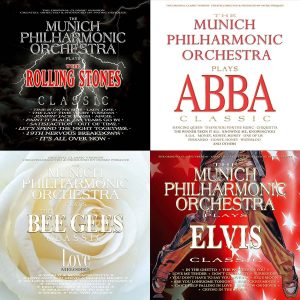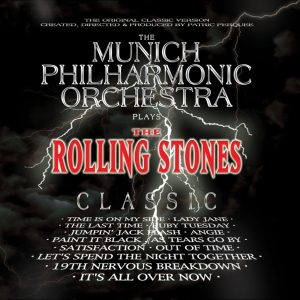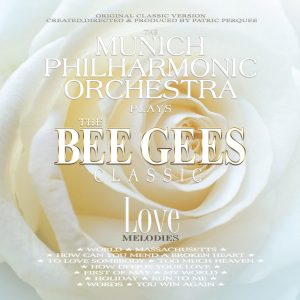- Munich Philharmonic Orchestra01 - First Of May 3:12
- Munich Philharmonic Orchestra02 - Massachusetts 2:43
- Munich Philharmonic Orchestra03 - How Can You Mend A Broken Heart 4:04
- Munich Philharmonic Orchestra04 - To Love Somebody 3:34
- Munich Philharmonic Orchestra05 - Too Much Heaven 4:57
- Munich Philharmonic Orchestra06 - How Deep Is Your Love 4:03
- Munich Philharmonic Orchestra07 - World 3:27
- Munich Philharmonic Orchestra08 - My World 4:10
- Munich Philharmonic Orchestra09 - Holiday 3:03
- Munich Philharmonic Orchestra10 - Run To Me 3:20
- Munich Philharmonic Orchestra11 - Words 3:21
- Munich Philharmonic Orchestra12 - You Win Again 4:01
- Munich Philharmonic Orchestra13 - To Love Somebody (Orchestral) 3:31
- Munich Philharmonic Orchestra14 - First Of May (Orchestral) 3:13
Dear music lovers,
I am glad that you are listening to my new production ‘The Munich Philharmonic Orchestra plays the hits of Bee Gees Classic – The Love Melodies’. This recording was produced by those involved with much love and enthusiasm. I did not use modern digital techniques to suppress the sounds which necessarily occor when acoustic instruments are used but to guarentee you the sound of the real orchestra as experienced at a live concert.
Yours,
Patric Perquee
‘The ear does not decide whether a recording is successful; the goose bumps do – that feeling you get when every note gets right under your skin and vibrates. That is the point at which music starts to have an erotic radiance’. Patric Perquee, born in 1954, and for many years a successful pop music producer, only lets his feeling – as the best barometer – assess his own work. For outsiders it is difficult to imagine how the cold enviroment of a studio full of technical equipment geared towards the functional cann allow for emotions inthose who work there. If any feelings are aroused, then it is due to the magical compositions of the ‘Bee Gees’ – Barry, Maurice and Robin Gibb – but also the knowledge that an orchestra of international renown is playing.
The Munich Philharmonic Orchestra – on the previous evening dress was the rule, as they played Anton Bruckner´s 7 Symphony in E – Major, conducted by Sergiu Celibidache, before hundreds of expectant music fans in festive attire. During the day, the valuable Stradivarius violin is clamped between a lumberjack shirt and an unshaven chin, becouse appearance doesn´t matter… ‘But to guarentee a perfect listening experience, I only consider the best musicians and their instruments’, says Patric Perquee. ‘It was of course great to be actively involved, in the eighties, in the rush of development of computer technology and its effect on the music world. But if all you do is sit in front of the screen, you will eventually go mad’. For Patric Perquee the computer quickly lost its attraction. He wanted to open up new territory, and expand his horizons, so he decided to cross the border between pop and classical music.
The orchestra scores were written on the basis of Perquee´s concepts of the planned arragements, with particular emphasis placed on originality. When the Gibb brothers mix a 13th chord of C major and D minor, this has quite unmistakable effect. According to Perquee: ‘These are the details which matter’. Perquee refuses to compress recordings, to bring them to one dynamic line: ‘From a technical point of view, the recording is capable of guaranteeing the perfect sound experience. Thus, the three-dimensional sound impression I get from the orchestra in concerts, in the Philharmonic Hall at Gasteig, must come across, when the music is played at home.’
The sound engineer for all Patric Perquee´s classical projects is in fact no less a figure than Mal Luker, who demonstrated his wonderful talents on film soundtracks such as ‘Indiana Jones’, ‘The Piano and ‘House Of The Spirit’.
Perfect mastery of recording techniques is also extremely important. The producer must deal with the contradiction of guaranteeing the soul of the orchestra, the typical sound of live acoustic instruments, yet still obtain a perfect recording. Perquee: ‘People have now become so spoilt to digital quality that even a noise which must occur when a cello is played can disturb them. This is the best proof that the technique of sampling has led music down a blind alley’.
When the orchestra recordings were finished, all traces were deleted with the ‘musical framework’ produced at the beginning. The next task was to combine the sound of the original hits with the classical arrangement. What synthesisers did ‘ABBA’ use? How did the typical sound of the guitar in the intro to the STONES´ classical ‘Satisfaction’ come about? How was the organ solo in the Bee Gees ballad ‘First Of may’ produced? Patric Perquee: ‘I had to find all this out‘. This attention to datail went so far that in the studio even the same instruments, amplifiers and microphones were installed.
‘The Munich Philharmonic Orchestra plays ABBA, The BEE GEES, ELVIS, The ROLLING STONES Classic’ – a trademark for outstanding sound artistry – created, directed & produced by Patric Perquee.
T.A.
Audio samples do not correspond to the original length and original quality !


® All rights reserved | © Copyright by Giacomo Records
Web-Creation by Sencillo Design&Sound / Vienna









